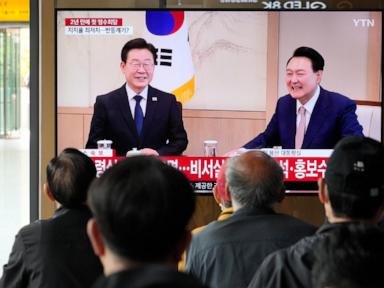SEOUL, South Korea — Emboldened by his party’s recent election win, South Korea’s opposition leader Lee Jae-myung pressured President Yoon Suk Yeol to accept special investigations into allegations involving top officials and his wife, as they met Monday for talks on bipartisan cooperation.
The meeting was their first since Yoon, a conservative former top prosecutor, took office in 2022 after defeating Lee, a liberal former provincial governor, in the country’s closest presidential election race. During their 2022 campaigns, Yoon, Lee and their supporters demonized each other and filed dozens of lawsuits against one another.
Yoon proposed the meeting as he faces growing calls to cooperate with Lee’s Democratic Party, whose victory in the April 10 parliamentary election allows it to extend its control of the single-chamber National Assembly until after Yoon’s single five-year term ends in 2027.
In his lengthy opening remarks, Lee, now the Democratic Party chairman, said the election results mean “the people’s stern demand for correcting wrong government administrations,” addressing economic troubles and restoring democratic rules.
Lee urged Yoon to accept independent probes into the 2022 Halloween crush in Seoul that killed 159 people, and the 2023 death of a marine who drowned during a search-and-rescue operation for flood victims. Lee’s party has accused Yoon of ignoring public demands and retaining top officials and military commanders responsible for the deadly incidents.
Lee also asked Yoon to resolve “diverse suspicions involving his family” that “poses a big burden on government operations.” That was apparently a reference to first lady Kim Keon Hee, who faces an allegation of involvement in a stock price manipulation and other scandals.
“I’d say it would be good for you, as president, to respect the National Assembly and consider the opposition party as a partner for government operations,” Lee said.
While listening to Lee’s statement, Yoon nodded several times and said he had expected Lee to make such comments but didn’t elaborate. Their meeting was closed to media after Lee and Yoon’s opening remarks.
Senior presidential adviser Lee Do-woon said after the meeting that Yoon told Lee that he won’t oppose a special law to investigate the Halloween deaths. But he said that concerns over the powers of an ad-hoc investigation committee must be resolved first. Yoon and Lee didn’t discuss Lee’s demands for other probes, according to Yoon’s office.
During the meeting, Lee also asked Yoon to accept his contentious idea of the government giving 250,000 won (about $180) to all South Koreans as a way to boost the economy, a step that Yoon’s party has called a populist measure. Lee Do-woon, the presidential adviser, said Yoon said that he prefers selectively supporting those in need.
In a separate briefing, Democratic Party spokesperson Park Sung-joon accused Yoon of lacking the resolve to revive public livelihoods. Park cited Lee as suggesting he was disappointed at the meeting’s results though the start of direct communication with Yoon would still be meaningful.
No agreement was reached, but Yoon’s office said the president and Lee agreed to meet again, without setting a date.
In one positive news for bipartisan cooperation, Lee told Yoon that his party would support the government’s high-stakes push to increase medical school students, which prompted thousands of young doctors to walk out of the job in February. The government recently suggested it’s open to halving its target medical school enrollment increase to 1,000 next year from the previously proposed 2,000, but doctors say they can’t accept any increase in students.
Yoon has said South Korea needs to create more doctors as it has one of the world’s most rapidly aging populations and its doctors-to-patient ratio is among the lowest in advanced economies. Doctors say schools can’t deal with a too steep increase in students, but critics say they simply worry the supply of more doctors would eventually result in lowering their income.
The parliamentary election was seen as a litmus test of Yoon, who has been struggling with low approval rating and an opposition-controlled parliament that has limited his policy agenda since his inauguration. Critics say the election defeat was largely attributable to the government’s failure to suppress rising prices and other economic problems and Yoon’s personal management and leadership styles.
Despite the election defeat, Yoon’s major foreign policy agendas will likely remain unchanged as they mostly don’t require parliamentary endorsements. Yoon has pushed hard to boost cooperation with the United States and Japan to cope with North Korea’s evolving nuclear threats and other challenges.
During Monday’s meeting, Yoon and Lee didn’t have meaningful exchange of opinions on North Korea and other foreign policy issues, according to Yoon’s office.
